|
|
|
Sort Order |
|
|
|
Items / Page
|
|
|
|
|
|
|
| Srl | Item |
| 1 |
ID:
162448
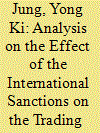

|
|
|
|
|
| Summary/Abstract |
Since the two North–South Korean Summits on April 27 and September 18, 2018,
the relationship between the two countries is thawing at a neck-breaking pace. And
the media is busy churning out optimistic forecasts about the reunification of the
two Koreas. However, as the governments of South Korea and the United States
have officially stated, the lifting of sanctions on North Korea can be considered only
after an agreement between the related countries on denuclearization is reached.
Also, considering the fact that denuclearization itself is a lengthy, stepwise process
that takes years, it is likely that the lifting of sanctions would happen in line with
progress on denuclearization
|
|
|
|
|
|
|
|
|
|
|
|
|
|
|
|
| 2 |
ID:
097090
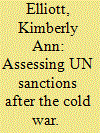

|
|
|
| 3 |
ID:
145479
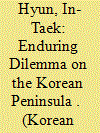

|
|
|
|
|
| Summary/Abstract |
This paper sheds new light on the North Korean nuclear conundrum, which has long been the source of security dilemmas on the Korean Peninsula, and South Korea’s strategic choices with regard to it. In doing this, this paper deals with four research questions: 1) How serious are North Korea’s nuclear and missile capabilities?; 2) What are the implications of international sanctions and countries’ positions?; 3) Can and will South Korea and the international community stop the North Korean nuclear program successfully?; and 4) And if not, what should South Korea do? This paper indicates that in the wake of North Korea’s fourth nuclear test and subsequent missile test, North Korea’s nuclear Pandora’s Box is almost about to open. It urges that if it indeed opens, it would completely change the strategic environment of the Korean Peninsula and Northeast Asia. This deep frustration and a sense of urgency have driven South Korea and the international community to impose stronger and tougher sanctions against North Korea than before. However, this paper argues that multiple factors––South Korea’s limited ability; the escalation of the U.S.-China global and regional rivalry; the strategic consideration of countries involved, especially China; and North Korea’s tenacious survival strategy—engage in strong pessimism, leaving the North Korean nuclear situation unresolved. Therefore, on the one hand, South Korea has to make every effort to denuclearize North Korea until the last minute, exhausting every possible option and means. However, on the other hand, it has to prepare for a worst-case scenario. This paper points out that South Korea’s exit strategy should be a “strategy of delicate deterrence” that is a comprehensive strategy of deterrence to combine military, political and diplomatic means.
|
|
|
|
|
|
|
|
|
|
|
|
|
|
|
|
| 4 |
ID:
137758


|
|
|
|
|
| Summary/Abstract |
This article examines the impact of UN-imposed sanctions on the stability of the Eritrean regime, with a focus on the reaction of the diaspora. It explores the transnational nature of Eritrean society and examines the history and structure of the Eritrean diaspora as well as its transformation since the political crisis of 2001. The article demonstrates that the government, as well as both its supporters and its opponents in the diaspora, have all instrumentalized sanctions for their own purposes. The government has used sanctions to rally supporters “around the flag”, calling on the diaspora to raise funds to negate their effect. By contrast, opposition activists have campaigned against the 2 percent “diaspora tax” levied by the government, arguing that it may be used for illicit military purposes in breach of the sanctions regime. In this sense, the sanctions have destabilized a core component of the regime's resource base. However, the failure of the diasporic opposition to organize a joint campaign to persuade host governments to outlaw the collection of the tax has undermined its efforts. Funds raised through the diaspora tax thus continue to flow into government coffers, playing a stabilizing role in spite of the UN sanctions regime.
|
|
|
|
|
|
|
|
|
|
|
|
|
|
|
|
| 5 |
ID:
097085


|
|
|
| 6 |
ID:
121716
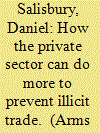

|
|
|
|
|
| Publication |
2013.
|
| Summary/Abstract |
The nuclear and missile programs of Iran and North Korea provide a continuing reminder of the importance of preventing illicit trade in proliferation-sensitive technologies. Last month's UN panel of experts final report on the implementation of sanctions on Iran, for example, concluded that "Iran continues to seek items for its prohibited activities from abroad by using multiple and increasingly complex procurement methods, including front companies, intermediaries, false documentation and new routes."
|
|
|
|
|
|
|
|
|
|
|
|
|
|
|
|
| 7 |
ID:
175557
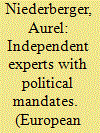

|
|
|
|
|
| Summary/Abstract |
Some experts take on political mandates and simultaneously base their authority on a claim to independence: this balancing act enables international organisations (IOs) to incorporate ‘independent’ experts and generate ‘objective’ knowledge around their policies. However, how do these experts reconcile the contradictory roles of a mandated expert and an independent expert? I address this question by taking recourse to Goffman's sociology and two related concepts: sociological ambivalence refers to situations in which a person faces conflicting expectations. This conflict can be remedied through role distance, that is, behaviour that signals a degree of disaffection from the role one is currently performing while one simultaneously continues to perform that role. I conduct a case study of ‘independent’ experts hired by the UN Security Council to monitor sanctions, analysing how their position is sociologically ambivalent and how their knowledge practices are interlaced with performances of role distance. The findings have two implications for macro-phenomena: first, by keeping their contradictory role constellation functional, experts make it possible for IOs to mobilise ‘independent expertise’. Second, because experts perform role distance through the way they produce knowledge, role distance leaves traces in political knowledge.
|
|
|
|
|
|
|
|
|
|
|
|
|
|
|
|
| 8 |
ID:
142433
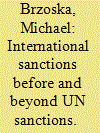

|
|
|
|
|
| Summary/Abstract |
United Nations sanctions are authorized by the international body that is legally charged with the maintenance of international peace and security, the UN Security Council. They are grounded in provisions of the UN Charter. However, only a fraction of all international sanctions are mandated by the UN. One of the findings of this article, which is based on data collected by the Targeted Sanctions Consortium (TSC), is that the large majority of UN sanctions are preceded by non-UN sanctions, particularly sanctions by the United States and the European Union. Furthermore, it is common practice, particularly by the US and the EU, to add sanction provisions of their own to UN sanctions. As a result, for most UN sanctions, there are also non-UN sanctions against the same targets. Such combined sanction regimes add restrictions imposed by only some governments to those that all countries have to implement. Combined sanction regimes are therefore potentially more effective in achieving the targeted outcome than UN sanctions, which represent the lowest common denominator achievable among the members of the UN Security Council. On the other hand, combined sanction regimes might suffer from a type of ‘sanctions fatigue’. A growing number of states outside of the West are openly opposed to unilateral sanctions. Adding non-UN sanctions to UN sanctions might reduce their willingness to support UN sanctions. The TSC data, however, does not support such a contention. Rather, the data indicates that combined sanction regimes are more effective than stand-alone UN sanctions. Still, the US and EU governments—as the main drivers of sanctions policy in general and UN sanctions in particular—need to be aware of this criticism in order not to unwittingly undermine the UN sanctions instrument.
|
|
|
|
|
|
|
|
|
|
|
|
|
|
|
|
| 9 |
ID:
046064
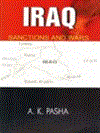

|
|
|
|
|
| Publication |
New Delhi, Sterling Publishers Private Limited, 2003.
|
| Description |
ix, 163p.Hbk
|
| Standard Number |
8120725611
|
|
|
|
|
|
|
|
|
|
|
|
Copies: C:2/I:0,R:0,Q:0
Circulation
| Accession# | Call# | Current Location | Status | Policy | Location |
| 046867 | 956.7/PAS 046867 | Main | On Shelf | General | |
| 057888 | 956.7/PAS 057888 | Main | On Shelf | General | |
|
|
|
|
| 10 |
ID:
129213
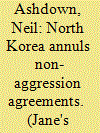

|
|
|
| 11 |
ID:
174731
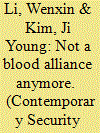

|
|
|
|
|
| Summary/Abstract |
What has driven China’s policy toward United Nations (UN) sanctions on North Korea? While insisting on a peaceful settlement of North Korean nuclear issues via diplomatic dialogues, China has gradually loosened its protective stance regarding UN sanctions on North Korea. This article examines the factors that have pushed China to take a tougher position toward North Korea: North Korea’s increasingly aggressive nuclear policy, the influence of the United States on Chinese foreign policy, and the changing perception of North Korea in China. Through close examination of China’s domestic discussions on North Korea, this article concludes that, besides the external factors, a growing negative perception of North Korea has played an increasingly important role in changing China’s official stance. The findings suggest that closer attention should be paid to the changes in the domestic political environment of China to understand its current and future approach toward North Korea.
|
|
|
|
|
|
|
|
|
|
|
|
|
|
|
|
| 12 |
ID:
134078
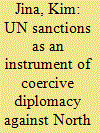

|
|
|
|
|
| Publication |
2014.
|
| Summary/Abstract |
North Korea has recently been subject to a greater amount of pressure than ever, but there is a gap between the desired outcome and reality. Hence, this study aims to examine the effectiveness of the international sanctions on North Korea and conditions that help coercive measures work successfully. It explores how coercive diplomacy operates and how well it works, how UNSC resolutions have developed and how compliant UN member states are with those resolutions based on an examination of country reports submitted to the UN Sanctions Committee. Although the UNSC resolutions carry ascending enforcement power and expanded the scope of actions and strengthened enforcement measures, there is asymmetry in interest and capacity of UN member states and implementation has been uneven globally. Hence, this study presents policy implications and suggestions for successful sanctions on North Korea.
|
|
|
|
|
|
|
|
|
|
|
|
|
|
|
|
|
|
|
|
|